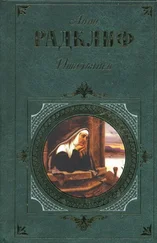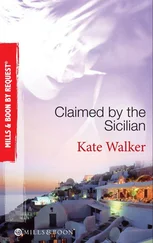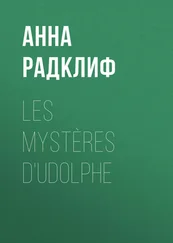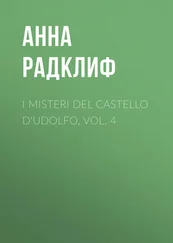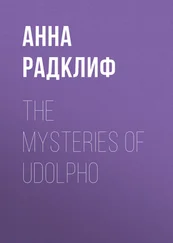Анна Радклиф - A Sicilian Romance
Здесь есть возможность читать онлайн «Анна Радклиф - A Sicilian Romance» — ознакомительный отрывок электронной книги совершенно бесплатно, а после прочтения отрывка купить полную версию. В некоторых случаях можно слушать аудио, скачать через торрент в формате fb2 и присутствует краткое содержание. Жанр: literature_19, Ужасы и Мистика, foreign_fantasy, на английском языке. Описание произведения, (предисловие) а так же отзывы посетителей доступны на портале библиотеки ЛибКат.
- Название:A Sicilian Romance
- Автор:
- Жанр:
- Год:неизвестен
- ISBN:нет данных
- Рейтинг книги:3 / 5. Голосов: 1
-
Избранное:Добавить в избранное
- Отзывы:
-
Ваша оценка:
- 60
- 1
- 2
- 3
- 4
- 5
A Sicilian Romance: краткое содержание, описание и аннотация
Предлагаем к чтению аннотацию, описание, краткое содержание или предисловие (зависит от того, что написал сам автор книги «A Sicilian Romance»). Если вы не нашли необходимую информацию о книге — напишите в комментариях, мы постараемся отыскать её.
A Sicilian Romance — читать онлайн ознакомительный отрывок
Ниже представлен текст книги, разбитый по страницам. Система сохранения места последней прочитанной страницы, позволяет с удобством читать онлайн бесплатно книгу «A Sicilian Romance», без необходимости каждый раз заново искать на чём Вы остановились. Поставьте закладку, и сможете в любой момент перейти на страницу, на которой закончили чтение.
Интервал:
Закладка:
Ann Ward Radcliffe
A Sicilian Romance
A Sicilian Romance
On the northern shore of Sicily are still to be seen the magnificent remains of a castle, which formerly belonged to the noble house of Mazzini. It stands in the centre of a small bay, and upon a gentle acclivity, which, on one side, slopes towards the sea, and on the other rises into an eminence crowned by dark woods. The situation is admirably beautiful and picturesque, and the ruins have an air of ancient grandeur, which, contrasted with the present solitude of the scene, impresses the traveller with awe and curiosity. During my travels abroad I visited this spot. As I walked over the loose fragments of stone, which lay scattered through the immense area of the fabrick, and surveyed the sublimity and grandeur of the ruins, I recurred, by a natural association of ideas, to the times when these walls stood proudly in their original splendour, when the halls were the scenes of hospitality and festive magnificence, and when they resounded with the voices of those whom death had long since swept from the earth. 'Thus,' said I, 'shall the present generation—he who now sinks in misery—and he who now swims in pleasure, alike pass away and be forgotten.' My heart swelled with the reflection; and, as I turned from the scene with a sigh, I fixed my eyes upon a friar, whose venerable figure, gently bending towards the earth, formed no uninteresting object in the picture. He observed my emotion; and, as my eye met his, shook his head and pointed to the ruin. 'These walls,' said he, 'were once the seat of luxury and vice. They exhibited a singular instance of the retribution of Heaven, and were from that period forsaken, and abandoned to decay.' His words excited my curiosity, and I enquired further concerning their meaning.
'A solemn history belongs to this castle, said he, 'which is too long and intricate for me to relate. It is, however, contained in a manuscript in our library, of which I could, perhaps, procure you a sight. A brother of our order, a descendant of the noble house of Mazzini, collected and recorded the most striking incidents relating to his family, and the history thus formed, he left as a legacy to our convent. If you please, we will walk thither.'
I accompanied him to the convent, and the friar introduced me to his superior, a man of an intelligent mind and benevolent heart, with whom I passed some hours in interesting conversation. I believe my sentiments pleased him; for, by his indulgence, I was permitted to take abstracts of the history before me, which, with some further particulars obtained in conversation with the abate, I have arranged in the following pages.
CHAPTER I
Towards the close of the sixteenth century, this castle was in the possession of Ferdinand, fifth marquis of Mazzini, and was for some years the principal residence of his family. He was a man of a voluptuous and imperious character. To his first wife, he married Louisa Bernini, second daughter of the Count della Salario, a lady yet more distinguished for the sweetness of her manners and the gentleness of her disposition, than for her beauty. She brought the marquis one son and two daughters, who lost their amiable mother in early childhood. The arrogant and impetuous character of the marquis operated powerfully upon the mild and susceptible nature of his lady: and it was by many persons believed, that his unkindness and neglect put a period to her life. However this might be, he soon afterwards married Maria de Vellorno, a young lady eminently beautiful, but of a character very opposite to that of her predecessor. She was a woman of infinite art, devoted to pleasure, and of an unconquerable spirit. The marquis, whose heart was dead to paternal tenderness, and whose present lady was too volatile to attend to domestic concerns, committed the education of his daughters to the care of a lady, completely qualified for the undertaking, and who was distantly related to the late marchioness.
He quitted Mazzini soon after his second marriage, for the gaieties and splendour of Naples, whither his son accompanied him. Though naturally of a haughty and overbearing disposition, he was governed by his wife. His passions were vehement, and she had the address to bend them to her own purpose; and so well to conceal her influence, that he thought himself most independent when he was most enslaved. He paid an annual visit to the castle of Mazzini; but the marchioness seldom attended him, and he staid only to give such general directions concerning the education of his daughters, as his pride, rather than his affection, seemed to dictate.
Emilia, the elder, inherited much of her mother's disposition. She had a mild and sweet temper, united with a clear and comprehensive mind. Her younger sister, Julia, was of a more lively cast. An extreme sensibility subjected her to frequent uneasiness; her temper was warm, but generous; she was quickly irritated, and quickly appeased; and to a reproof, however gentle, she would often weep, but was never sullen. Her imagination was ardent, and her mind early exhibited symptoms of genius. It was the particular care of Madame de Menon to counteract those traits in the disposition of her young pupils, which appeared inimical to their future happiness; and for this task she had abilities which entitled her to hope for success. A series of early misfortunes had entendered her heart, without weakening the powers of her understanding. In retirement she had acquired tranquillity, and had almost lost the consciousness of those sorrows which yet threw a soft and not unpleasing shade over her character. She loved her young charge with maternal fondness, and their gradual improvement and respectful tenderness repaid all her anxiety. Madame excelled in music and drawing. She had often forgot her sorrows in these amusements, when her mind was too much occupied to derive consolation from books, and she was assiduous to impart to Emilia and Julia a power so valuable as that of beguiling the sense of affliction. Emilia's taste led her to drawing, and she soon made rapid advances in that art. Julia was uncommonly susceptible of the charms of harmony. She had feelings which trembled in unison to all its various and enchanting powers.
The instructions of madame she caught with astonishing quickness, and in a short time attained to a degree of excellence in her favorite study, which few persons have ever exceeded. Her manner was entirely her own. It was not in the rapid intricacies of execution, that she excelled so much in as in that delicacy of taste, and in those enchanting powers of expression, which seem to breathe a soul through the sound, and which take captive the heart of the hearer. The lute was her favorite instrument, and its tender notes accorded well with the sweet and melting tones of her voice.
The castle of Mazzini was a large irregular fabrick, and seemed suited to receive a numerous train of followers, such as, in those days, served the nobility, either in the splendour of peace, or the turbulence of war. Its present family inhabited only a small part of it; and even this part appeared forlorn and almost desolate from the spaciousness of the apartments, and the length of the galleries which led to them. A melancholy stillness reigned through the halls, and the silence of the courts, which were shaded by high turrets, was for many hours together undisturbed by the sound of any foot-step. Julia, who discovered an early taste for books, loved to retire in an evening to a small closet in which she had collected her favorite authors. This room formed the western angle of the castle: one of its windows looked upon the sea, beyond which was faintly seen, skirting the horizon, the dark rocky coast of Calabria; the other opened towards a part of the castle, and afforded a prospect of the neighbouring woods. Her musical instruments were here deposited, with whatever assisted her favorite amusements. This spot, which was at once elegant, pleasant, and retired, was embellished with many little ornaments of her own invention, and with some drawings executed by her sister. The cioset was adjoining her chamber, and was separated from the apartments of madame only by a short gallery. This gallery opened into another, long and winding, which led to the grand staircase, terminating in the north hall, with which the chief apartments of the north side of the edifice communicated.
Читать дальшеИнтервал:
Закладка:
Похожие книги на «A Sicilian Romance»
Представляем Вашему вниманию похожие книги на «A Sicilian Romance» списком для выбора. Мы отобрали схожую по названию и смыслу литературу в надежде предоставить читателям больше вариантов отыскать новые, интересные, ещё непрочитанные произведения.
Обсуждение, отзывы о книге «A Sicilian Romance» и просто собственные мнения читателей. Оставьте ваши комментарии, напишите, что Вы думаете о произведении, его смысле или главных героях. Укажите что конкретно понравилось, а что нет, и почему Вы так считаете.

